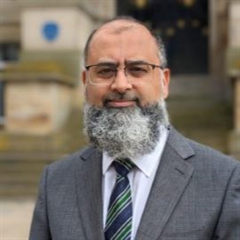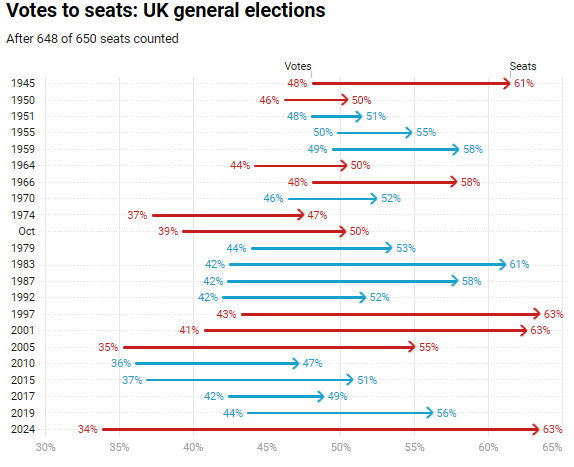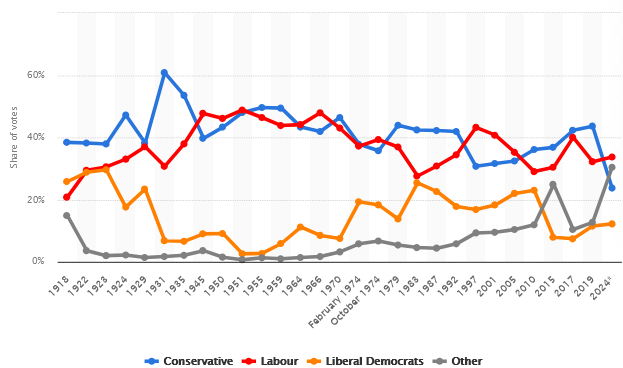The 2024 UK General Election delivered a landslide majority to Labour giving them an 86 seat majority at 412 seats out of 650 total seats in the House of Commons.
Important aspects of the election: the vote share, the rise of independents and political violence.
The Labour party got 33.7% of the vote and yet they got 63.38% of the number of seats in the Commons.
As the graph shows, a government’s vote share has never been so low, with data showing that this is the lowest vote share of any government dating back to 1918.
There are multiple ways of interpreting this, the first that this shows that the Labour Party were clever in how they used a strategy made for our FPTP system, or the second that it shows a lack of confidence in politics as a whole.
“Don’t hate the player, hate the game.” A saying often said by winners in video games when their win is controversial or disputed by others.
The 2024 Labour campaign was much more wide spread in the country when compared to the 2019 campaign. This time they focused on relatively safe tory seats like South West Norfolk and Aylesbury. Whilst the Labour party won by respectively small margins, both times the Labour candidate winning by 630 votes.
The Labour 2019 Election resulted in 10.2 million votes where as the 2024 election got 9.7 million, and yet the 2024 election got 412 seats in contrasts to Corbyn’s 202.
The 2024 campaign chose not to hoard votes in Labour safe seats and instead attempted to convert other seats and spread out labour support, resulting in more seats less confidently, rather than less seats very confidently. However a result of this risk taking behaviour has been two would-be cabinet ministers losing their seats and the Lib Dems, Greens, Reform and independents gaining seats.




Gaza
Intertwined with the rise of protest candidates is the issue of Gaza. Something Jonathan Ashworth and Thangam Debbonaire know lots about. At the heart of the issue is that lots people feel that Israel ( a jewish state) is attacking and killing Palestinians ( whom belong to a muslim state), as a result of the conflict lots of muslims globally feel a solidarity with other muslims and side with people of their own religion and oppose the attacking of Palestinians, on the other hand lots of jewish people globally saw the 7th October attack and felt solidarity with Israel. This conflict had a sizeable impact on the 2024 election, the Labour party stance on Israel has been a carefully planned one.
The context of the Labour Party’s stance is Corbyn. Since Corbyn the party has been very careful not to do or say anything that could lead to them being accused of being antisemetic, as a result they have agreed with the conservative party on every line given when talking about the war in Gaza. Whilst it’s worth pointing out that one doesn’t have to be jewish or Muslim in order to vote according to a candidates stance on Gaza, it isn’t unreasonable to think that those who have more in common with those being attacked (be it Jewish or Muslim) are more likely to have them in mind when voting.
This leads us to the rise of independents. The general election gave the country 6 independents, Jeremy Corbyn, Ayoub Khan, Shockat Adam, Adnan Hussain, Iqbal Mohamed. Each owing their win to the issue of Gaza.

Jeremy Corbyn had the whip removed, being the life-long rebel, he stood as an independent in his constituency and won. As for Ayoub Khan, previously a lib dem councillor, before causing a scandal by posting about conspiracy theories which question the October 7th attacks on Israel. He then left the lib dems, ran as an independent and was supported by the pressure group “The Muslim Vote” and successfully won his constituency. Shockat Adam was previously the chair of the NGO Muslim Engagement and Development, during the campaign Gaza was an issue heavily focused on, with a notable comment made after winning exclaiming “this is for Gaza”. Adnan Hussain won his seat, taking it from Labour, his campaign had a strong focus on Gaza, with comments of 2014 resurfacing where at a free palestine rally he said that what the IDF had done “was a holocaust” and stated he wanted to see “Israel burn” as Palestine had. Iqbal Mohamed, prior to winning in the election was an IT consultant, he won on a ticket of pro-palestine rhetoric and raising concerns for the cost of living crisis and the state of the NHS. Mohamed referred to the action in Palestine as “genocide” and stated that he believed that politics had been taken over by people that were “pro-war and selfish”.
Although quite a few pro-palestine candidates won, some didn’t quite make it, giving labour a real shock when a number of prominent MPs almost didn’t win, in this instance thinking of Wes Streeting and Jess Phillips.
The common thread linking all the independents is Israel and Palestine, all the independents are muslim and have large muslim backing. Through the lack of action by the Labour Party on calling for a ceasefire or condemming Israel’s actions, the independents took advantage of this and made the election a referendum on the issue of Israel-Gaza, allowing the Labour Party to push people away from their position and towards alternatives.
The Green Party
The Green Party stunned the country with their record increase in seats to a total of 5. Underestimate this party at your peril, they have lurked on the edges of politics waiting to increase their vote share. They owe their victory in part to the the polls showing an overwhelming Labour win, voter negligence by the main political parties and their own policies.
To start, leading up to the general election, all polls indicated a strong Labour win, this undoubtedly lead many voters to vote with their heart as opposed to tactically voting under the assumption that a Labour win was assured so it didn’t matter who they voted for (the inverse of voter apathy). To show the extent of this confidence, political commentator and journalist Owen Jones recommending to his supporters to vote green in response to the polls showing Labour winning.
Voters being neglected. Polls show that an increasing number of voters want more policy to address climate change. In spite of this there has not been much commitment by the main political parties. With the Conservatives banning on-shore wind farms and Labour U-turning on its £28B commitment on green energy. In response to this lack of action by tthe establishment, people who feel strongly about climate change may have shifted to a party that they feel aligns more with their political priorities.
Intimidation
The Israel-Gaza issue was a hot one, with tensions running high it’s not unsurpirsing for things to boil over. Though this election was unlike any other particularly in certain constituencies.
Jess Phillips spoke out about this when accepting her seat, saying it was the worst campaign she has ever ran, detailing anecdotes of women from her campaign being chased in the street, verbally abused and intimidated. Jonathan Ashworth also spoke on LBC about similar circumstances when he was campaigning. It’s clear this election was unlike any other. Though this is only a part of our politics it shows the result of UK politics becoming so polarised and that the stakes are so high that these sorts of actions can be justified.
In order for the issue to end, it must be attacked head on, not just by the PM but by all political actors, the media and all political parties. A calculated and intentional toning down of rhetoric will decrease violence and anti-social behaviour in our politics in the same way that when language is amped up political violence increases.
To be continued…

